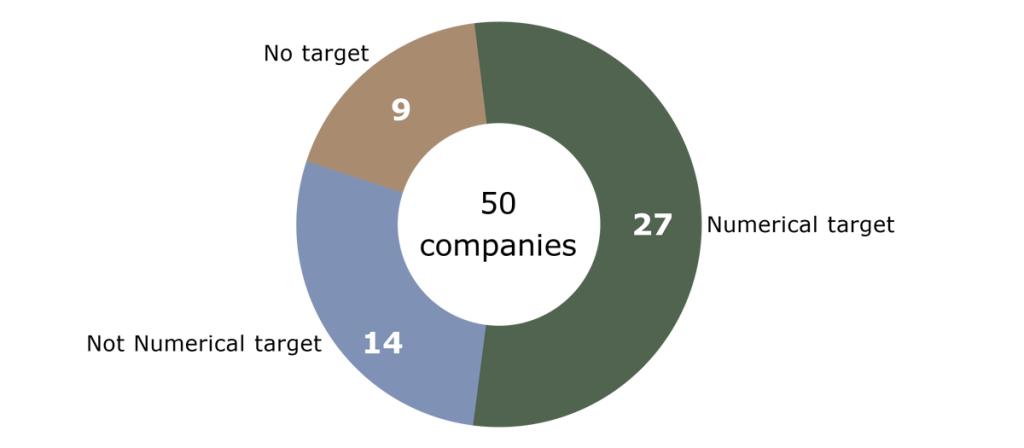
Corporate Biodiversity Strategy
Are companies becoming nature-clever?
We looked into corporate progress on becoming nature-positive investigating fifty corporate global players. What surprised us was the enormous spread on the biodiversity action spectrum: a few frontrunners enact brilliant ideas, but many companies are still lacking even basic insight into their nature footprint.
Every year, the World Economic Forum asks leaders worldwide how seriously they are concerned about global economic, environmental and social threats as part of its annual Global Risks Perception Survey. Every year, risks relating to biodiversity loss move up a notch on the Richter Scale of global threats. This year, biodiversity came in as risk number three – after climate action failure and extreme weather 1 . Learnings from climate policy tell us that we cannot rely on governments to fix global environmental crises. Companies are waking up to the fact that biodiversity loss is a real threat to global supply chains, communities, and natural resources essential to economies and societies. The jolt that net zero targets have sent through decisions at every level of a company is now about to be amplified by the need to gain a deeper understanding of a company’s biodiversity links in order to create resilient supply chains, address investor demands, and comply with future reporting requirements.
To understand corporate progress on biodiversity matters better, we conducted a study examining publicly available reports issued by 50 multinational companies in terms of their approach to nature-positive action. Companies were selected from a wide range of industries with varied level of exposure to biodiversity risk. We chose a large proportion of corporates from high-risk industries such as Energy and Mining & Metals, and a smaller proportion from low-risk industries such as building products to shine a light on how well-prepared businesses are. We evaluated companies on five criteria: their biodiversity goals, specific targets, actions taken and disclosures plus their sustainability commitments more generally.
The main finding that stood out was a significant spread in level of commitments – a few companies have made serious commitments, while a significant number are yet to start the process. Out of the companies we examined, nearly three quarters have made some form of commitment to biodiversity, however only 14% have distinctly included biodiversity as part of their core values. Most executives did, however, include sustainability more generally as part of their company’s vision or mission. This indicates that while sustainability is steadily becoming a strategic priority, biodiversity clearly lags behind.
From the 50 companies examined


Although the vast majority of companies have taken some action that contributes towards their impact and dependencies on ecosystems, few activities have directly targeted nature loss. Efforts are usually made under the heading of sustainability, where some of the biodiversity risks are also mitigated but a significant portion of such risks remains unaddressed. Also, actions tend to focus on mitigating environmental impact rather than dependencies, indicating that companies may not be capturing their reliance on ecosystems to a great extent or lack comprehensive understanding of their dependencies on nature in the first place.
Finally, we found that only half of the companies have set up concrete numerical targets, usually on number of projects, impact drivers, biodiversity loss, ecosystem services and net positive impact. Companies also use different frameworks for disclosure which further impacts the comparability of such reports.

There are three underlying causes for companies to shy away from taking decisive nature-positive action:
- lack of understanding on biodiversity and how it relates to businesses,
- lack of data, and
- uncertainty about using the most suitable methodologies and the high level of complexity of such tools.
Companies have started to recognise nature as a form of capital with inherent risks and values, but they are yet to develop sufficient understanding to prepare and deliver a reliable biodiversity strategy. Data collection tends to be considerably more complex for nature than climate reporting, which limits the quantity and quality of data sources available. Supported by online tools and guidelines, tracking supply chain emissions has eased over the years, but in the absence of similarly sophisticated tools, tracking changes in biodiversity still demands continuous local presence, making it more challenging.
In response to the need for a universal and more accessible reporting methodology, the Task Force for Nature related Financial Disclosures (TNFD) is working on a new disclosure structure, drawing upon elements of its sister framework on climate (TCFD). In addition, public entities such as the International Union for Conservation of Nature and Natural Capital Coalition have published a series of guidelines or protocols for planning and monitoring corporate biodiversity performance as well measuring impact and dependencies.
Some frontrunner companies, most notably coming from land-use intensive sectors, have already begun making a positive impact on nature while also shaping the international biodiversity agenda. Paper mill company Stora Enso recognises biodiversity as one of the biggest impact and opportunity areas. The company regularly reports on forest conservation efforts through a proprietary reporting tool based on five pillars - High Stumps, Deadwood, Soil and Water, Habitats and Tree Retention. Energy leader EDP has set out a clear environmental policy on addressing biodiversity loss and achieving a positive outcome on its biodiversity balance sheet. Comprehensive monitoring of endangered species and developing environmental genomics tools are examples of their key initiatives. Recognising its impact and responsibility as a global consumer brand, Coca Cola promotes sustainable agriculture and water use, with projects focussing on both its operations and supply chain. Most importantly, all three companies have included biodiversity as a part of their strategy or vision and disclose their progress using proprietary tools or frameworks.
Just a month after the COP27 Climate Change Conference in Egypt, the UN Biodiversity Conference COP15 is now taking place in Montreal. The challenges observed in corporate biodiversity strategy are comparable to the early stages of bringing climate change onto the agenda: lack of understanding of the topic, uncertainty about policy developments as well as uncertainty about what to measure and to report on. Meanwhile, the UN Global Biodiversity Framework is set to be adopted at COP15. It is considered to be the Paris Agreement for nature. While metrics and regulatory requirements have not been finalised, they will eventually become relevant to all organisations. Preparation and foresight will allow corporate leaders to stay ahead of the curve by focussing on capacity building in regards to emerging legislation and reporting tools. In addition, creating a basic nature-related risk profile will help companies prepare a more comprehensive biodiversity strategy and become nature-clever.




